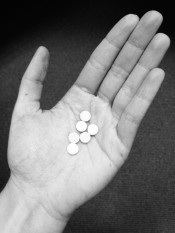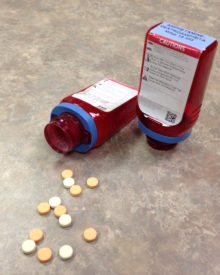A kid doesn’t have to bring an odd-looking homemade device to school to attract attention from the authorities.
A prescription pill will do the trick.
A child who pulls out an antibiotic capsule at the water fountain may be marched to the principal’s office for questioning. Schools have to comply with drug laws, and they worry about keeping students safe on campus. So teachers and staff have been trained to watch for possible misuse of drugs.
Every public school district in Georgia has policies for handling medications on campus. Although details vary from one district to the next, some rules will be the same in Albany as in Athens or Atlanta.
The big one is that all prescription medications – in their original, labeled containers – must be stored in the school’s clinic. Medicines are kept locked up, and kids must come to the clinic, where the school nurse will administer pills, ear drops, eye drops and the like.
Inhalers and EpiPens (for allergic reactions) are handled the same way by most elementary schools, but differently for older kids. Middle school and high school students can keep these on their persons, but only after they’ve been brought in and registered with the school. Parents can also complete a form enabling older students to administer their own over-the-counter meds, such as ibuprofen for cramps or antihistamines for allergies.
School nurses are especially careful about medications that can be addictive or abused. These include anti-anxiety medications, antidepressants, and drugs such as Adderall, used to treat ADHD.
School nurses handle these “controlled” medications as hospital nurses would, according to Faye Warden, lead nurse for Oconee County schools.
“We count [the pills] to make sure the medicine’s being given correctly,” says Warden. Prescriptions are also kept under lock and key so that only a nurse can access them.
Safety is at the center of school policies, says Sam Preston, a hearing officer with Clarke County schools. Preston and fellow school officials are concerned with the safe administration of medications and preventing abuse. So enforcement is strict.
Disciplinary actions range from verbal or written warnings to expulsion, depending on the circumstances and the school district’s code of conduct.
A learning experience for parents
“It depends on what the child’s intent was,” says Preston. Sometimes innocent mistakes are made.
And such misunderstandings can easily extend to parents. Joe Dennis, who has three children in Clarke County schools, says he and his wife were not fully aware of the rules when their oldest started middle school.
“Our oldest son, Jaden, has asthma and a severe peanut allergy, and because of that, he should have an EpiPen and an inhaler with him wherever he goes,” says Dennis. Jaden’s inhalers and EpiPens come in an outer package with smaller, sealed packs inside. The prescription label is affixed to the outer package.
When Dennis took unopened multipacks to school for the first time, they were rejected because they didn’t have the pharmacy’s label. Fortunately, the nurse was willing to work with him and kept Jaden’s prescriptions for the day until Dennis could bring in the labeled packs. “We weren’t aware [of the full policy] initially; we are now,” says Dennis.
Schools post their medication policies on their websites, and forms for registering drugs or asking nurses to administer them are available in English and Spanish. Parents with questions should call the school, advises Warden, the school nurse.
The best option is to treat drugs like odd-looking homemade devices. Keep them at home.
If a medication regimen absolutely requires a dose during school hours, work that out with the school authorities. Otherwise, avoid the hassle and don’t carry drugs onto campus.



